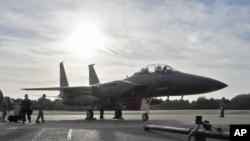The Obama administration announced plans Wednesday to sell up to $60 billion worth of advanced fighter aircraft, helicopters and related weapons systems to Saudi Arabia. The package is aimed at helping Saudi Arabia deal with potential threats from Iran and regional terrorism.
The outlines of the arms deal - the largest in U.S. history - had been known for some time, but the administration withheld an official announcement pending consultations with the U.S. Congress. Under its terms, the United States will provide Saudi Arabia with 84 advanced F-15 fighter planes with electronics and weapons packages tailored to Saudi needs. An additional 70 F-15's already in Saudi hands will be upgraded to match the capabilities of the new planes.
Saudi Arabia will purchase a huge fleet of nearly 200 Apache, Blackhawk and other U.S. military helicopters, along with a vast array of radar systems, anti-aircraft and anti-ship missiles, and guided bombs.
Officials put the total value of the sales package at as much as $60 billion but said it could be less if Saudi Arabia elects not to exercise purchase options over the 15 to 20 year span of the deal.
At a press event announcing the sale, Assistant Secretary of State for Political-Military Affairs Andrew Shapiro said it reinforces the existing long-term U.S. military relationship with Saudi Arabia.
Shapiro said a potentially-nuclear armed Iran is one threat the package is designed to deter, but that there are others, including terrorist threats to Saudi Arabia's oil facilities, and border problems such as recent incursions of tribal militants from Yemen.
"It's not solely about Iran. It's about helping the Saudis with their legitimate security needs, and they have a number of legitimate security needs. They live in a dangerous neighborhood and we are helping them preserve and protect their security in a dangerous neighborhood against legitimate security threats," said Shapiro.
Assistant Secretary of Defense for International Security Affairs Alexander Vershbow said the buildup of Saudi capabilities could eventually reduce the need for U.S. military deployments in the Gulf region.
"When one looks at future challenges, having allies throughout the Gulf region who are inter-operable with U.S. forces, who are capable, who have trained together with our forces, it means we have partners and allies we can look to in future contingencies," said Vershbow. "So it means we may have to station fewer forces on a continuing basis in the region."
Vershbow said the United States has had high-level consultations with Israeli officials on the pending sale, and that Israel does not object to it.
Israel has long had U.S. F-15 fighters in its arsenal and recently has committed to purchase new F-35 strike fighter jets, which U.S. officials say will preserve Israel's qualitative military advantage in the Middle East.
The U.S. Congress could block the Saudi arms deal. Assistant Secretary Shapiro said, however, that contacts with key House and Senate leaders make administration officials confident that Congress will not be a barrier to the completion of the sale.




